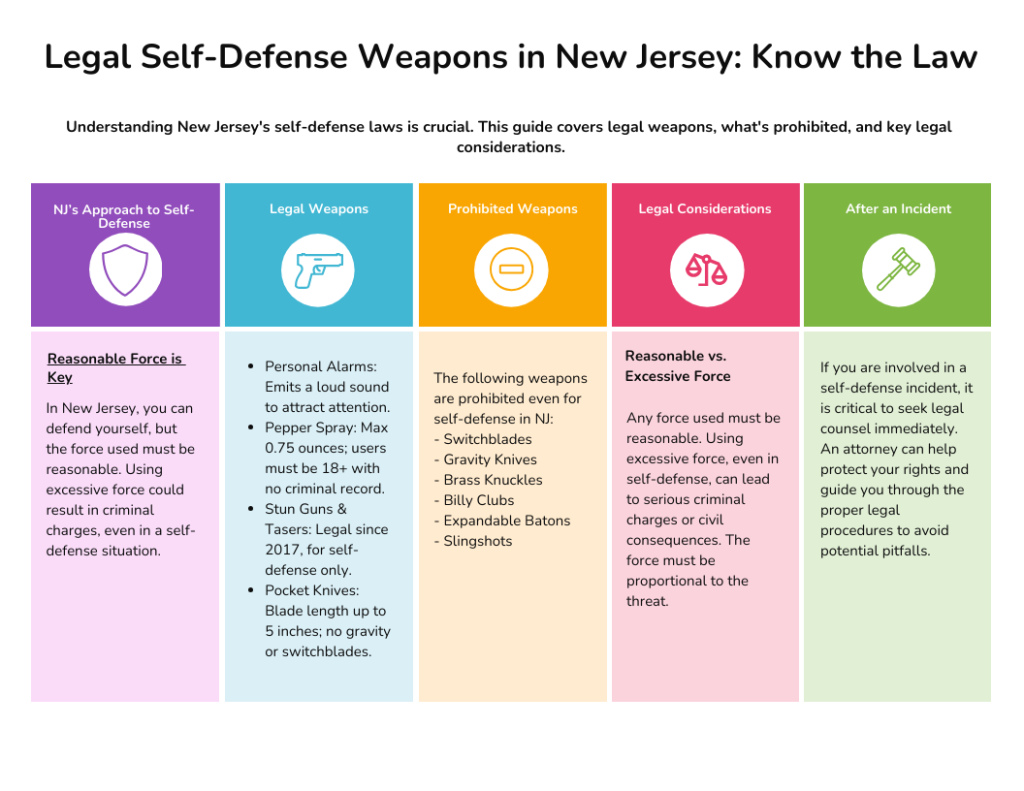With personal safety becoming an increasing concern for many, it’s important to understand how self-defense law works in New Jersey and what self defense weapons are legal in NJ. New Jersey is known for its stringent weapon laws and has not adopted the ‘stand your ground’ law that other states have, which allows people to use deadly force when in a self-defense situation.
On This Page:
- New Jersey’s Approach to Self-Defense
- Legal Self-Defense Weapons in New Jersey
- Prohibited Weapons in New Jersey
- Legal Considerations When Defending Yourself
- What To Do If You Were In A Self-Defense Situation
There is the NJ castle doctrine, which provides legal guidelines for someone using force to protect their home. Understanding self-defense laws and what self defense weapons are legal in NJ can help an individual feel protected while still within the legal boundaries.

New Jersey’s Approach to Self-Defense
New Jersey’s self-defense laws emphasize the importance of using non-lethal methods whenever possible. The state does allow an individual to defend themselves with force when necessary to prevent injury or harm but maintains that the amount of force should be reasonable. If an individual does end up taking the life of someone else in self-defense they will likely still be arrested until the facts of the case can be determined, and even then if it is determined more than a reasonable amount of force was used in the self-defense, the individual could face manslaughter charges. One of the things that will be taken into account in these types of cases is the weapon that was used for self-defense, including legal self defense weapons NJ.
Legal Self-Defense Weapons in New Jersey
In New Jersey, there are a number of legal self defense weapons in NJ that a person may carry for the purposes of self-defense. They provide varying amounts of force but are all meant to effectively dissuade an attacker. Some of the most common of these include:
- Personal Alarms: Personal alarms are legal and a non-violent way to deter attackers. They are typically a small button that can be worn, and when pressed, emits a very loud sound meant to attract attention and disorient potential threats.
- Pepper Spray: Pepper spray law nj allows individuals to carry a canister of pepper spray for self-defense purposes. The canister cannot exceed 0.75 ounces (approximately 22 grams). It is only meant to be used for self-defense, and users must be at least 18 years old with no criminal record to legally carry it.
- Stun Guns and Tasers: As of 2017, following a federal court ruling, you are allowed to use a stun gun or taser in new jersey to legally defend yourself. However, as with pepper spray, stun guns must only be used for self-defense purposes. Are tasers legal in new jersey? Yes, but misuse of a stun gun could result in criminal charges, and individuals must be at least 18 years old to purchase and carry one.
- Pocket Knives: Carrying a pocket knife for self-defense is legal knives in nj as long as the knife does not exceed 5 inches in blade length and is not classified as a “gravity knife” or “switchblade.” These knives should only be used for lawful purposes, not as weapons for aggression.
Prohibited Weapons in New Jersey
There are a number of other types of self defense weapons legal in NJ, but which are prohibited to civilians, including but not limited to:
- Switchblades
- Gravity Knives
- Brass/Metal Knuckles
- Billy Clubs
- Slingshots
Are batons legal in NJ? Expandable batons are also typically prohibited for civilians and can only be used by law enforcement officers or persons who have a permit.
Legal Considerations When Defending Yourself
Although it may feel that if you did not initiate the attack and are defending yourself from harm, any amount of force should be considered reasonable, this is not always the case. It’s important to understand how New Jersey views self-defense and that there are things to consider that could have legal implications. As mentioned above, an individual is expected to use a reasonable amount of force to neutralize the threat against them. If the force used proves to be excessive, the person who was defending themselves could face criminal charges.
It’s also important to use any legal self defense weapons in NJ responsibly and follow any extra restrictions related to their use. For example, it is typically illegal to bring pepper spray into a school, government building, or airport. Always check local regulations before carrying a weapon in public places. Keep receipts or proof of purchase for legal self defense weapons nj and consider getting training on how to use these weapons effectively and safely.
What To Do If You Were In A Self-Defense Situation
If you’ve been involved in a self-defense situation, it’s important to seek legal counsel immediately. An experienced self-defense attorney can help you navigate New Jersey’s self-defense laws and protect your rights. While you have the right to defend yourself and your family, it’s crucial to avoid legal pitfalls. Always prioritize non-lethal and proportionate responses to threats.



